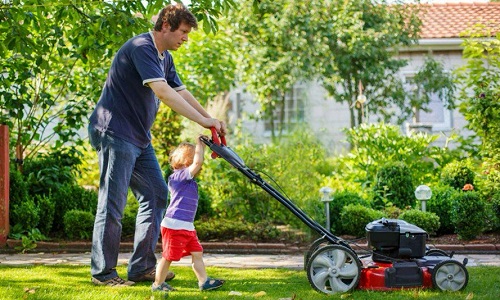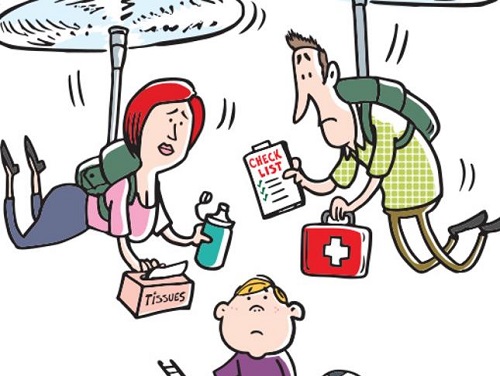Are you a Lawnmower Parent?
Who are Lawnmower Parents, and why are they causing more harm than good?
We know what the term Helicopter Parents is used for – a breed of parents that continuously hover over their child in order to make sure the child follows their instructions and suggestions at every step.
But now it seems another genre of parents have emerged which have taken helicopter parenting to a new level – the Lawnmower Parents.
What exactly is a Lawnmower parent?
The term was first used by a teacher who noticed a dad bringing his daughter a S’well bottle filled with water to school because his daughter didn’t want to drink water from the school’s water fountain. There was nothing wrong with the water fountain and the entire school used to go there. But since his daughter considered it “an inconvenient, tiring activity”, the dad added this to his to-do list. This resulted in her teacher coining the term “lawnmower” in a blog as she wrote, “Lawnmower parents go to whatever lengths necessary to prevent their child from having to face adversity, struggle, or failure. Instead of preparing children for challenges, they mow obstacles down so kids won’t experience them in the first place.”
The psychology:
The fact that these parents want to do the hard work themselves so things get easier for their children shows how much they want their kids to find life easy and avoid failure. They have good intentions. They do all sorts of stuff for their children because they don't want to see their kids struggling. Often these Lawnmower Parents have a past with failure, or they had parents who were too strict with them when they were children. Hence, these parents do not want their children to face the setbacks and hardships that they had to go through.
What is bad about being a Lawnmower Parent?
Children need to have their own set of experiences to learn from. If we spoon-feed our children, we cannot blame them for not being able to hold a spoon when we are not around. Parents cannot stay with their children forever. Eliminating all kinds of struggle from your child’s younger years will not help in equipping him/her in ways to deal with failure in future. Children learn important lessons by experimenting, observing, trying, failing and seeking help. Making everything too easy for your children prevents them from learning important lessons of life.
“When you win, you win. When you lose, you learn.”
Watching your child go through the 'trial and error' phase may not be fun, but it is an important part of your child’s emotional development. If kids are not encouraged to toughen up and work on their own skills, they will keep on looking for help at every step of their life. Such children constantly (directly or indirectly) receive the message that they are not good enough to do stuff on their own. A Lawnmower parent may think of being over-protective as 'supporting their child' but in reality he/she is demonstrating that children cannot be trusted to accomplish things on their own.
“If we want our children to be successful, healthy adults, we must teach them how to process through their own challenges, respond to adversity, and advocate for themselves,” the teacher wrote.
How to prevent lawn-mowing in babies and toddlers
Good parenting starts from the day your baby is born. Teach your baby how to roll over and go down the bed instead of crying to make you come. As babies grow into toddlers, show them how to eat their own food no matter how messy the bib gets; to take off their socks and put shoes on; to wipe table if they spill a drink; to clean up after every playtime; to accept the word “No” at things they are not supposed to get (even if you can afford to buy those stuff); and to fight their own tiny battles in the playground when other kids snatch their toys, don’t let them use the slide, or take over their packet of chips. Observe their natural behavior first, and show them what to do in case they need help. Don’t run with a wet cloth every time there is a spill, or don’t jump into toddler-fights in the park. Let them try. Let them learn how to handle a situation so that they get the confidence to handle situations once you are not in the radius.
As children grow older, they will learn to rely on themselves. They will feel strong and independent, and will know how to handle situations without a parent helping them.
The bottom line is: Don’t mow their obstacles, teach them to jump and climb instead. Parents want the best for their children, and no matter how good the intentions are, not being a lawnmower parent is in the best interest of your child.
Return to Parenting Help section.
Return to Homepage.





New! Comments
Have something to say about what you just read? Leave me a comment in the box below :)